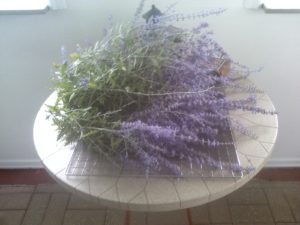Make Your Own Cleaner – skipping store-bought essential oils
by Guest blogger: Nicky Schauder
of Permaculture Gardens
Listen to her podcast HERE
One of the tenets of permaculture is “Produce no waste.”
Waste is not a bad thing. In fact, it is the stuff of which new stuff is made in permaculture. If you are reading this blog, you have most likely already learned from Farmer Greg what permaculture is all about and how it can regenerate the planet and help you grow abundantly. If you are new to permaculture, then read on.
Permaculture systems as we mentioned in a recent Urban Farm U podcast are cyclical design systems based on observation. Other people have different and better definitions that that. But this cyclical aspect of permaculture is what I wanted to focus on in this blog. These are gardening and living systems in which compost and seed-saving play key roles.
Composting food scraps along with the right amount of browns (25-30 parts nitrogen to 1-part carbon) will create humus-rich soil that will grow more vegetables and fruit for you in the next season. That way, you build fertility in the soil you currently have. Therefore, you wouldn’t need to haul in more topsoil (that has been carted from afar, destroying the soil life elsewhere) in order to create your garden.
Another way to create a cyclical food system at home is by making your own yogurt, from yogurt you may already have. Or by saving the seeds from the best-tasting tomato plant for next year. If you save your seeds, you do not need to buy new seeds for the next season. The beauty about seeds is that they are like time capsules that you can use when the season is right for them to grow again.
According to the documentary “SEED,” we’ve lost 94% of our seed varieties in the 20th century. Seed-saving is a practice that not only produces no waste, but increases diversity, and diversity brings with it so much good for your garden and your health. Urban Farm U hosts several wonderful workshops on this topic of seeds.
Benefits of Garden Diversity
Having a diverse garden means supporting a diverse population of both flora and fauna. This is how diversity brings about stability. Good bugs that come and take residence will help balance bad bugs out! It also creates a healthier microbiome in your gut when you eat more diverse vegetables.
You can live out the permaculture principle of “Produce No Waste” in your home often by growing food from things that you may already have on hand. This is the idea behind a 5-day “Plant Your Pantry Challenge” that we run on our website every year for free. It’s to get people realizing that all they need to grow a garden they may already own! Check out some of the pictures HERE entered by “Plant Your Pantry challengers” during our last run and you may want to sign-up for the “Plant Your Pantry Challenge” in the future.
Can we make our own?
Recently, I have wanted to find out if I could make my own organic cleaners without having to rely on store-bought essential oils. Those tiny bottles of precious oils are very costly and do not make this process of cleaning my house a cyclical system. If I could make cleaners without those small bottles, I might be able to make at least one more small part of my home more ecologically sound.
I kept on asking myself, “Could I not just harvest my own plants and coax the oils out of them?” Luckily, my teacher in a course I recently took, herbalist Rosalee de la Foret had just the recipe to prove that it can be done. She has generously given us permission to share it with you all.
Both the thyme and lavender in the recipe are antimicrobial herbs and white vinegar is a natural disinfectant.
Enjoy and if you try it out, let me know how the recipe worked for you at permaculturegardens@gmail.com!
 Antimicrobial Vinegar Cleaner
Antimicrobial Vinegar Cleaner
WHAT YOU’LL NEED…
- Roughly 3 cups of white vinegar
- 1 cup dried thyme leaves and flowers
- 1 cup dried lavender flowers
Directions…
- Place the dried herbs in a quart jar.
- Fill the jar with vinegar. Stir well.
- Cover with a plastic lid (not metal).
- Let this sit for 24 hours. The next day, the vinegar should be a lovely red color, which comes from the thyme.
- Strain out the vinegar well and place it in a spray bottle.
- Voila! You have your own super cheap, super effective herbal vinegar cleaner.
UrbanFarm.org/makeyourowncleaner
About this author:
 Nicky and her husband Dave are passionate about helping suburban families grow their own food. Together, they run Permaculture Gardens at growmyownfood.com, a web portal to help you grow abundantly!
Nicky and her husband Dave are passionate about helping suburban families grow their own food. Together, they run Permaculture Gardens at growmyownfood.com, a web portal to help you grow abundantly!
In 2017, Permaculture Gardens won the grand prize at the Green Festivals in Washington DC for “Most Innovative Sustainable Brand.” Their work has been featured in the Huffington Post, Permaculture Research Institute – Australia and Green America.org. They also volunteer at their local Title 1 school and started a permaculture garden after-school program for the elementary kids there.
How to reach Nicky and Dave:
Website: growmyownfood.com
Instagram: @permaculture_garden
Facebook: @permaculturegardens
Twitter: @PermacultureG
Email: permaculturegardens@gmail.com


 Antimicrobial Vinegar Cleaner
Antimicrobial Vinegar Cleaner




Awesome Nicky! What all can be cleaned by this cleaner?… do toilets qualify or is this more of a general mild cleaner? Also, would raw apple cider vinegar be even better? That’s something I’m working on learning how to make (white vinegar would be harder to replicate for cyclical intent though it is much cheaper to purchase).